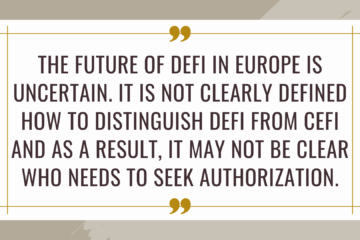Gaming vs Gambling: When May In-Game Items Exchange Constitute Gambling?
An enthusiastic Pokémon catcher (back in November 2017), I obviously could not wait to see how exactly Pokémon trading feature is going to work. In recent press-releases, Niantic has clearly indicated that trading feature is their top priority. Some publications suggested that payers would be able to search for available Pokémons inside the game, set the “exchange rates” (e.g. I will give you 2 Weedles for 1 Pikachu), and trade. Maybe it would even be possible to auction your Pokémons, Candies, Stardust or all of the above, which makes the game even more exciting. Most likely, it wouldn’t be possible to legally sell or transfer your account to someone else for a fee or trade Pokémons for real money. Nothing particularly new. The market for in-game items is well established and, according to some estimates, is a 2-digit billion global industry.
The majority of legal and compliance experts agree that there are two key differences between gaming and gambling:
– Is it primarily the game of skill or the game of chance?
– Can you take your winnings and convert them into the real-world money?
“Skills vs chance” question has largely been answered. See, for example, the EU Commission recommendation (2014/478/EU) defining online gambling as “any service which involves wagering a stake with monetary value in games of chance, including those with an element of skill, such as lotteries, casino games, poker games and betting transactions that are provided by any means at a distance, by electronic means or any other technology for facilitating communication, and at the individual request of a recipient of services.”
You could always try, but the chances are that in the eyes of many regulators online games and e-sports betting would qualify as games of chances with an element of skill. Maybe, chess playing could get a more favorable treatment, but you can’t be sure
However, the question of monetary payouts remains and, if you are one of the operators in the in-game exchange industry, this is probably your best bet to prove you have nothing to do with gambling for the time being.
I personally suspect that a 3rd, new criteria, could be introduced, and the industry probably needs it. I will tell you more about in just a few paragraphs. So – please, bear with me for a little more.
Let’s assume that Pokémon exchange grows exponentially and becomes the new CS:GO (stands for “Counter-Strike: Global Offensive”) skin exchange market. If you are like me 4 weeks ago and don’t know what a “skin” is, here is a digestible definition: “skins” are so called in-game items, such as a different color of your avatar or a different-themed weapon, a special Pokéball that does not impact in-game balance or gameplay. Those digital beauty products are similar to real-world cosmetics obsession in their illusion of a cosmetic effect: they don’t necessarily stop your ageing process, but somehow using them makes you feel better about yourself.
You can receive skins for playing well (or long enough), you can trade-in skins with other players, you can receive them as a gift or as support from your fans, if you are a popular Streamer, or you can buy them on one of the many-many marketplaces.
So, where is a catch?
The controversy around skins, gaming and betting has recently intensified, when the Washington State Gambling Commission told Valve (in writing, not just over a nice afternoon tea) to “immediately stop allowing the transfer of Counter-Strike: Global Offensive virtual weapons for gambling activities”. The major concern of this state regulator was that the skins were not only used for playing and having fun and making the game more exciting. Turned out, this huge second-hand market facilitating various forms of skin exchanges and e-sports entertainment, was abused by some operators and turned into semi-legitimate betting that might or might not have the elements of gambling. The really bad thing about it was that that fact that those activities in some cases were accessible for underage kids.
The problem with Washington Gambling Commission statement, as I personally see it, was two-fold:
– They could not establish that skins betting, in fact, meets the definition of gambling and
– They’ve got the wrong guy.
Which is exactly what Valve told them: Valve is not connected to any websites in question, did not authorize them, did not benefit from their activity, did not encourage anyone to join such websites, and, most importantly, did not provide any mechanism for cashing out or exchanging the skins for real money.
Cash is used and abused by all sorts of criminals all the time, but it would not be reasonable to require the Central Bank that is issuing banknotes and coins to “immediately stop facilitation” of all illegal activities with the cash they issued or to stop issuing cash at all, so that nobody can abuse it.
It obviously does not mean there was no problem – multiple legal uncertainties remain. Most likely, Valve would have to coordinate with the regulator going forward. For example, the answers to the following questions would have to be found:
- How to prevent minors from becoming victims of quasi-gambling activities or misleading advertising.
- How to address possible concerns over money-laundering and bet-fixing with some of the websites (it’s possible and those operations are potentially vulnerable to money laundering risks).
- Where to draw the line between gaming (including digital items exchange) and gambling (that needs a proper license and is illegal in many countries).
Similar to online poker and social gabling sites, it is quite possible that more of gambling operators will embrace the area of skin exchange and Pokémon trading. Why? – Because gambling and betting have been around since the beginning of times in every culture and adding a cash element always adds more excitement to the game.
However, licensed gambling may not the only future for in-game items exchange. Here is my theory.
Let’s take a step back and look at the definition of gambling one more time. Whatever national gambling regulation you look at, they all define gambling as an activity of gaming, betting or lottery, with an initial stake in the beginning for purpose of winning a monetary prize in the future.
So, if there is no monetary prize, there is no gambling? But what if (as some people may argue) – there is a semi-monetary value for skins or Pokémon items. Can we treat them as some form of virtual currency?
The question is not as hypothetical as you may think and it touches much more than just skins or Pokémons. Here are a few examples:
- Miles-and-More, telling me that if I spend $XXX with them this month, I may enter a chance of winning triple loyalty points and and/or a free upgrade for my next flight.
- Promocode from Shangri-La, asking me to book one-night stay and enter my e-mail for a chance to win a fantastic holiday package.
- What about second hand market of Birkin bags, vintage cars and any other second-hand trade-in market for that matter – you can auction you items, sell them, buy them back, mix them in lots, donate a portion of your sales… does it mean that every Birkin bag or a Chevrolet Corvette is also a virtual currency, because you can find for them a monetary value and exchange for cash?
These examples bring me back to a possible 3rd criteria that may help differentiating gaming from gambling. Which is essentially: when digital items or any other products that could be exchanged are considered to be equal to assets with a monetary value?
I would say that in order for an item to be considered a “money-in-kind” (and therefore the prize paid or received in such items would be similar to receiving it in cash), we have to analyze the following characteristics of an item in question. If the majority of the questions would be “yes”, then playing and winning these items would constitute gambling.
Durability – the value and the quality of the item is not deteriorating over time. If an item has only a short-term value (for example, 3 months), it’s not similar to a currency or a gold.
Acceptability and portability – many people and many websites must accept these items as payment methods, and the cost should not be too high.
Consistency and comparability – the items should be clearly recognizable and there should be no ambiguity what the item is and what should be its value. Some track record and history of acceptance would be important for anything that pretends to be a currency. It should not be like real estate where every object is reasonably unique.
Divisibility – if you split your Birkin bag into two parts, each part won’t cost ½ of the original value. Which is why diamonds and artwork are not really liquid payment methods. .
Supervision – who owns and regulates the system? Are all transactions tracked in a single place? Who decides how many items can be issued? Can someone cancel or reverse a transaction because it does not follow some rules? Is access to using these items is limited or restricted? How wide is the user base?
Let’s look at in-game items, airline miles/loyalty bonuses through these lenses:

Controversy established: a promo-code from Shangri-La, asking me to book one-night stay and enter my e-mail for a chance to win a fantastic holiday package has more resemblance to gambling than I expected.
Why nobody is bothering them or demanding to register as a gambling operator? Simply because their operations are not perceived as dangerous, minors-threatening ambivalent activities.
This is precisely why my advice to skin exchange operators would be to change the public perception and introduce more controls around protecting minors and catching possible bad guys trying to launder money. Under the current legislation and provided that these operators don’t offer winnings in cash, they may evolve into the direction of loyalty programs. Obviously, if there is a desire to have cash payouts, gambling license is a requirement.
What are the simple and non-negotiable must haves that can help in-game exchange platforms to be more credible and provide a safer environment for everyone:
- Be transparent about yourself on your website and tell the users who you are, where you are registered, how to contact you in case of questions and what are your terms and conditions.
- Clearly state your age policy and which services are available for which age groups. For example, viewing e-sports could be for everyone, but making transactions requires someone to be an adult. You should take it seriously; otherwise it could burn your business. No minors should be able to transact or access anything that has any resemblance to betting or gambling.
- Upgrade your user registration process and, as a minimum, collect the full name, address, date of birth and the contact details of every registered user. You need this to do the age verification and to make sure that users from countries that prohibit, for example, betting activities or other forms “game-for-fun”, even without any monetary prize, cannot register.
- Verify both e-mails and phone numbers – by SMS codes or return links.
- If your business is about e-sports entertainment, supporting streamers or e-sports betting, there is no way your marketing communications or advertising should look and feel like they are targeting children.
- Monitor and catch bad guys: you should have technical controls in your system detecting odd behavior. For example, it is a good idea to monitor users deploying the same device or the same credit card for purchasing different items under different account names. It is also a good idea to keep track of complaints and disputes and know where they concentrate. It may not only help you detect fraud, but also will show you bugs and vulnerabilities of your website features. Lastly, it is a great idea to introduce automatic limits per user / per day/ per transaction – and manually review and approve major outliers, because (believe me or not) fraudsters, terrorist and money launderers are not stupid and not imaginary, they are everywhere, including your user base, they are just waiting for the right opportunity to abuse it.
- Many gaming-related accounts are accessed via OpenID solutions (aka login with Google or Facebook). Users are not perfect and many of them have very simple passwords repeated across multiple websites. Help them. Don’t trust just one authentication factor and double-check the consistency of the user IP, device and other relevant behaviors. When a device is used for accessing different accounts, it could be an indication, that this is a public computer somewhere in the library, and it would be a great idea to deactivate any “remember me” features on such computes and prevent remembered logins. You don’t really want your user accounts to be stolen.




 ) about the “Travel Rule” for blockchain transfers and what might be the first simplified implementation of it for a FInTech startup that’s getting very confused by various complex
) about the “Travel Rule” for blockchain transfers and what might be the first simplified implementation of it for a FInTech startup that’s getting very confused by various complex